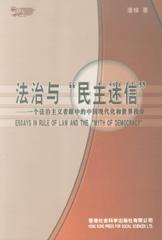-

Handbook of China's Governance and Domestic Politics
This Handbook looks at how China is governed, how its domestic political system functions and the critical issues that it currently faces. Governed by the world’s largest political party in the world’s longest-ruling Communist regime, China is undergoing a transitional period of rapid economic and social development. How this period is managed will have significant implications for the Chinese state and its population concerning China’s governance structures and economy, as well as the country’s justice, public health, education and internal/external security concerns. This transition to a modern state is not without its challenges – particularly in terms of how the Chinese state deals with diverse issues such as social inequality, corruption, separatism, increasing individualism and political reform. China’s governance and domestic politics also have possible major global consequences, especially in the context of China's continued rise within the international system. This Handbook will improve understandings of the core national dynamics of this rise and, as levels of international interdependence with China increase, can offer vital insights concerning China's domestic attributes. Gaining a better knowledge of China's internal workings can also help readers to better appreciate the multiple and varied problems that China’s leaders will face in the coming decades. Critically, many of the core internal issues facing China also have potential external repercussions, principally in terms of rising social unrest, nationalism, environmental degradation, resource shortages and attitudes towards globalization. This book covers these issues and will help readers to fully comprehend China’s ongoing contemporary global significance. -

Elites and Governance in China
This book reveals the complex relationship between elite perceptions and behaviour, and governance, in China. It moves away from existing scholarship by focusing on functionaries, grass-roots elites, leading intellectuals, and opinion-makers in China and by looking beyond the top leadership, makes a significant contribution to our understanding of shared governance and broadened political participation in China. The chapters in this collection explore the elites' role as opinion-makers, technical experts, producers of knowledge, and executives or managers, and pose a number of questions, the answers to which are crucial to understanding future political and economic development in China. What are elite perceptions of governance, inequality and justice; what do the elites mean by good governance; what is the influence of non-Chinese Communist Party elites in policy-making and implementation in China; how have they exerted their influence in the PRC and influenced its direction of future development; and what have grass-roots elites contributed to governance in local communities? Providing a keen insight into the role elites have played in governing China since 1978, this book is a pioneering effort to bring together elite studies and governance studies. As such, it will be highly relevant for policy-makers within international organizations, governments, and NGOs outside China as well as appealing to scholars and students interested in Chinese politics and governance. -

China's Future
China's future is arguably the most consequential question in global affairs. Having enjoyed unprecedented levels of growth, China is at a critical juncture in the development of its economy, society, polity, national security and international relations. The direction the nation takes at this crossroads will determine whether it stumbles and ultimately stalls or whether it continues to develop and prosper. Will China be successful in implementing a new wave of transformational reforms that could last decades and make the country the world s leading superpower by 2025? Or will the PRC shy away from the drastic changes required and risk stagnation or even regime collapse? Or will China instead emerge as a hard, authoritarian and aggressive superstate? In this new book, David Shambaugh, one of the world s leading Sinologists, argues that these potential pathways are all possibilities - but they depend on key decisions yet to be made by China's leaders, different institutions and groups in Chinese society, as well as being shaped by other nations. Drawing on four decades of experience studying and visiting China, Shambaugh assesses these challenges and their implications, offering a stimulating and thoughtful study of China's future for all those seeking to understand the country's likely trajectory over the coming decade and beyond. -

在革命与现代化之间
党治国家终结了20世纪上半叶以来一直困扰人们的政权“内卷化”趋势,但远没有完成政治共同体的正规化和合理化的现代化过程,即“获得现代性”的过程。 对于在一党执政体制内谋求长期执政的政党而言,尤其是在资源动员和分配上承受巨大压力的情况下,以党权的轴心地位来强化中央权威,以党权的巩固扩张来拓展改革空间,以党权的集中统一来打破利益分割,以党权的合法运用来支持法律秩序,可能就是党治国家在特定历史条件下走向现代国家的必经阶段。 国家治理意味着不仅应该有一个体系完整、职能科学、监管合理、调控有效的政府体系,还应该有一个相对独立自主、广泛参与公共事务、有力监督和控制政府的社会体系。 在中国走向现代国家的路上,共产党执政方式面临的最大问题,在于它能否正确地解决现代国家建设中政党与国家的法律关系,即“党权”与“法权”的关系,而判断共产党执政方式是否走向成熟的重要标志之一,则要看它能否成功地把宪法的最高权威和法律的刚性约束内化为政党行为的理性自觉,即内化为政党的“法的精神”。 -

Information for Autocrats
This book investigates the new representation unfolding in Chinese local congresses. Drawing qualitative fieldwork and data analysis from original surveys of 5,130 township, county, and municipal congressmen and women and constituents, Melanie Manion shows the priorities and problems of ordinary Chinese significantly influence both who gets elected to local congresses and what the congresses do once elected. Candidates nominated by ordinary voters are 'good types', with qualities that signal they will reliably represent the community. By contrast, candidates nominated by the communist party are 'governing types', with qualities that reflect officially valued competence and loyalty. However, congressmen and women of both types now largely reject the Maoist-era role of state agent. Instead, they view themselves as 'delegates', responsible for advocating with local government to supply local public goods. Manion argues that representation in Chinese local congresses taps local knowledge for local governance, thereby bolstering the rule of autocrats in Beijing. -

法治与“民主迷信”
谁会宣称自己不是民主制的支持者呢?民主全能。民主能让人民都作主,能治腐败,能让人人平等,能让政治清明,能让世界上所有的老百姓都过上好日子。它高于家庭、高于民族、高于主权、高于人权,还高于一切非西方人的生命权。这就是目前弥漫于世人之间的民主迷信!笔者不反民主,甚至还有些喜欢民主,可也不信民主教,更不信那些虔诚的“启蒙”者能把中国人民都变成民主信徒。中国充满困境,但笔者不信民主能解决中国社会的主要困难。笔者希望回到政治文明的原点来讨论民主,讨论民主化,讨论今天的民主十字军。这么做的目的只有一个,就是提醒国人,不要从一个陷阱跳入另一个陷阱。就目前中国的情况而论,适宜建立的不是虚妄的民主,而是法治导向、由六大支柱构成的所谓“咨询型法治”。这六大支柱包括中立的文官系统;自主的司法系统;独立的反贪机构;独立的审计系统;以全国和省人民代表大会为核心的广泛的社会咨询系统;以及受法律充分保护的言论、出版、集会和结社的自由。这种法治有六大特点,即强调“法律”作主,拒绝“人民”做主;强调法的正义性,因而特别重视“法律面前人人平等”;强调严格执法的重要性,刻意增加立法难度;强调限制政府的职能和规模,造就有限政府,保障社会经济生活的自由,从而鼓励民族的创造力;强调政府行为的透明;强调追求符合中华传统的秩序与自由。本书所收论文,从法治、现代化和秩序等不同的角度讨论了上述问题。